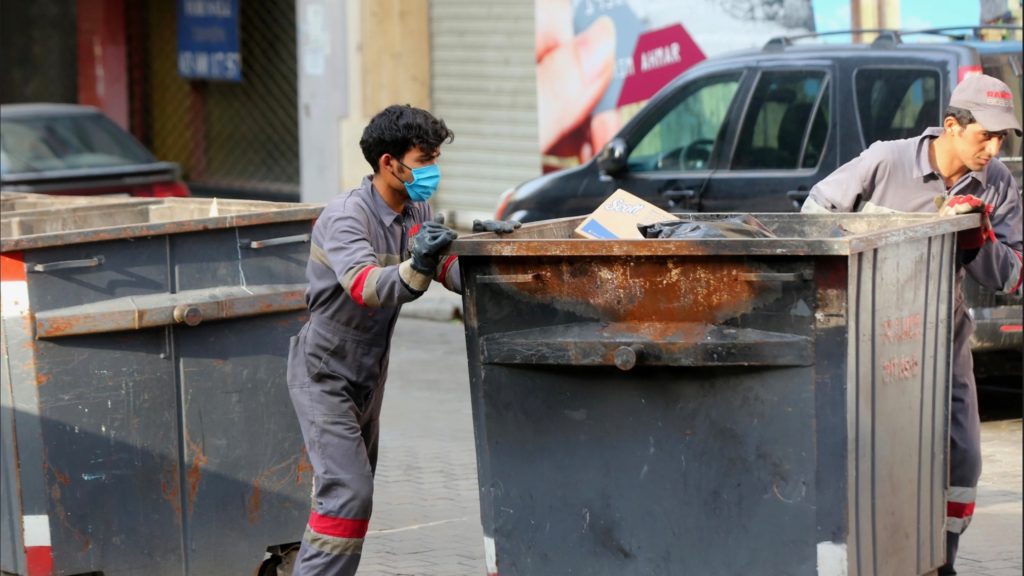In late April, migrant workers from the Ramco waste collection company in Lebanon began a confrontation with the company’s management. Their demands are for wages to be in U.S. dollars, as stipulated in their contract, and not in the totally devalued Lebanese pound. But they’re also fighting against the daily abuse they suffer by the company. In Lebanon, migrants are subjected to the “kafala” system, a system that only allows migrants to legally reside in the country under the terms of their relationship to their job and employer.
Ramco, which won a five-year contract to take over garbage collection in Beirut, employs around 400 workers, including 250 Bangladeshis, the rest being Indian, Syrian, and Lebanese workers. According to the company, their salary is about $400 USD a month. However, Lebanon is going through a deep economic crisis and its currency has been severely devalued. In response to this, Ramco started paying its employees in local currency and not in U.S. dollars. This caused widespread outrage, especially among migrant workers who need to be paid in dollars in order to send remittances to their families back home.
The company says it pays the equivalent of wages in Lebanese pounds. But the workers complain that their wages in pounds correspond to an undervalued exchange rate: 1,515 pounds to one dollar, while the rate in the market is 4,200 pounds to one dollar. With that exchange rate, their wages have effectively been slashed by two-thirds of its original value.
As a reaction to this massive pay cut, Ramco’s migrant workers, mainly from Bangladesh and India, went on strike to demand their wages. They’re also denouncing the company’s decision to pay them only a part of their already slashed wages, following the lockdown measures taken by the Lebanese government. Instead of being paid 26 days a month, they’re only receiving the equivalent of 13 days.
In addition to this financial exploitation, foreign workers are fighting against the the violent torture of one of Ramco’s employees. According to several workers interviewed, on April 8, Enayet Ullah, an employee with mental illness, was locked up for three days on company premises, where he was subjected to physical and psychological torture. “He was beaten so mercilessly that even we were shocked” said a worker to Al Arabiya.
Riot police "trying to contain a riot" when in fact this is the riot police attacking migrant workers.
Migrant workers in 'Ramco' company did not stop collecting our trash in #Lebanon since the beginning of #Covid_19 pandemic. They are demanding fair pay in USD. pic.twitter.com/JV468yjyZR
— Luna Safwan – لونا صفوان (@LunaSafwan) May 12, 2020
The company, as well as the Bangladesh embassy (which is trying to end the strike along with Ramco), deny these reports of torture. However, what they cannot deny is the onslaught of police repression against workers last week after they blocked the main gate of Ramco in Beirut, preventing trucks from leaving.
Despite this repression, the workers’ determination has remained intact and they are standing up to the company. The gravity of this choice should not be simplified. This is a historic strike: according to the Legal Agenda of Lebanese NGOs, this strike is perhaps the first of its kind and could mark a “turning point” for migrant workers in the country.
In Lebanon, migrant workers are subject to the “kafala” system that directly links the rights of foreign workers’ residences to their boss. Migrant workers are excluded from the Lebanese Labour Code. However, the collective force of the strike is proving that when workers act together, repressive legislation can do nothing. Ultimately, it is the balance of power that decides the fate of the conflict.
This strike is also important because it takes place during a period of class tension in Lebanese social life. Since last October, the country has been plagued by demonstrations against poverty, against the corruption of political parties, and against the current regime. In recent weeks, following the worsening of the economic situation, the demonstrations have become more radical. In this context, the resistance of Bangladeshi and Indian workers in Ramco is a part of a larger trend of working class resistance. Inspired by the October revolution in Lebanon, the Bangladeshi workers chanted “Thawra,” which means revolution in Arabic, a word that has resonated throughout the Middle East for a decade.
Within several countries in the region, especially those in the Persian Gulf, foreign labor is over-exploited and mostly in the private sector. Employers and governments use the old tactic of pitting workers against each other. Migrant workers are often used as “scapegoats” to blame for the economic crisis.
So far, the overexploitation of migrant workers has been presented as a differential between maintaining the “privileges” of native workers — a kind of ultra-reactionary pact between the dominant classes and the local populations.
Now, in the face of the crisis and rising unemployment, they are trying to put pressure on “national” workers to take over the jobs of foreign employees, i.e., pushing down the cost of labor. This is what Ramco’s CEO understood when he said that “perhaps new jobs will be opened for Lebanese citizens, many of whom need this opportunity more than ever.
The strike by Bangladeshi and Indian workers at Ramco is, in this sense, very good news, a hope against the reactionary post-Covid world that the capitalists want to build. A victory for the Ramco strikers could have important consequences not only for migrant workers in Lebanon, but for the whole region.
This article was originally published in Révolution Permanente.











